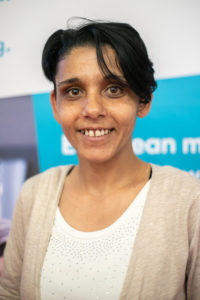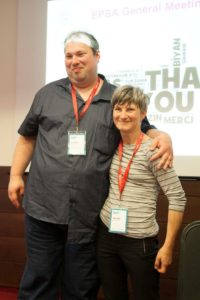“To go wherever I want to go and to do whatever I want to do, without anyone’s approval” – “To decide where I can live, who I want to live with, how I spend my free time” – “To be able to meet new people” …
These are just some of the answers provided by self-advocates when being asked “What does independent living mean to you?” at this year’s Europe in Action conference. “Everyone can live by the river” was the motto of the conference, which means that everyone has the right to be independent and to decide about their own life.
Sadly, many people with intellectual disabilities are still put into institutions which segregate them from the rest of society. This prevents them from living their life the way they want to.
How can inclusion become a reality everywhere?
The aim of this year’s Europe in Action conference, which took place in Vilnius in Lithuania and was hosted by our member Viltis, was to provide new ideas on how to make inclusion happen everywhere, for everyone. The conference was based upon two main topics:
- How to support the transition from institutions into the community
- How to support people once they live in the community, for example through supported decision-making, support in finding employment and accessibility measures
With Lithuanian Minister of Social Security and Labour Linas Kukuraitis as a patron, “Europe in Action” saw speakers from a range of backgrounds including keynote speaker Elisabeta Moldovan who fought her way out of an institution, UN CRPD committee member Jonas Ruškus and Marco Migliosi from the European Commission’s Disability and Inclusion unit.
Topics of the workshops and talks presented covered a wide range of issues such as universal income, the right to independent living according to the UN Convention on the Rights of Persons with Disabilities, employment opportunities for people with intellectual disabilities or the role of the family on the way to an independent life. Examples were presented from many different countries including Austria, Belarus, Germany and Lithuania, as well as Armenia, Kyrgyzstan or Japan.

Reaching out to the locals
Conference participants also had the opportunity to reach out and discuss with the people of Vilnius, with two meetings held in Užupis and at Lukiškių Square. People with intellectual disabilities organised in the new social initiative “Viltis – POWER OF COFFEE” prepared coffee and invited passers-by to enjoy a fresh brew and discuss about independent living:
So, how can we make inclusion happen everywhere, for everyone? Summarising the conference outcomes, Inclusion Europe’s Secretary-General José Smits concluded: “The aim is no less than to change society. But we can do it little by little and start with the people we know. What is the next small step you want to take?”
Video message of UN CRPD committee member Robert Martin for Europe in Action
How can independent living work for people with complex support needs? Here an example from JAG. At the conference we heard from Manuel Lankmair from Lebenshilfe Austria.
Thank you to Senada Halilčević, and welcome to László Bercse!
Several changes took place at Inclusion Europe’s General Assembly and the General Meeting of the European Platform of Self-advocates:
At the conference, Senada Halilčević stepped down as EPSA chair – she had been in this position for ten years. Senada’s successor is László Bercse from Hungary, who is now also one of Inclusion Europe’s vice-presidents. Oswald Föllerer from our Austrian member “Selbstvertretungszentrum für Menschen mit Lernschwierigkeiten” became a member of the EPSA steering group.
Bryndís Snæbjörnsdóttir from our Icelandic member Landssamtökin Þroskahjálp was elected to the board. Helene Holand from Norway finished her involvement in the board, serving maximum years possible.
Inclusion Europe also welcomed new members: The GADIR self-advocacy group of Plena Inclusión and the French “Association les jeunes handicapés”.

You can find photos of Europe in Action on Facebook and read all posts with the conference hashtag #EiA19 on Facebook and Twitter.
Speakers’ presentations
Elisabeta Moldovan .pptx (Romanian)
Manuel Lankmair .pptx + interview with M. Lankmair
Raquel Manzano Torres .pdf + Raul Olivera .pdf
Pavla Baxová .pptx + workshop activity .pptx
Anne Marie Duffy and Kathleen McTigue .pptx + evaluation form .pdf
Albert Branstätter, Andreas Zehetner .pptx + Bernhard Schmid .pptx
Sirpa Makinen, Rikka Manninen, Wilma Kariko, Jonna Suhonen .pptx
Lilya Panteleva .pptx (Russian)
Nurgul Sultanova .pptx (Russian)
László Bercse .pptx + interview with L. Bercse
Save the date for our next conferences!
Hear our voices! self-advocacy conference: 18-20 September 2019
Europe in Action: 27-29 May 2020 – the topic will be inclusive education
The conference in numbers
- 239 participants from 40 countries
- Speakers from 24 countries: 17 self-advocates, 14 family members + other activists and experts
#eia19 in numbers:
239 participants
109 🇱🇹
130 outside Lithuania
40 countries17 self-advocate speakers
14 family members speakers
+ other activists and professionals
24 countries2 open sessions engaging with the Vilnius public
TONS of sunshine
— Milan Sverepa (@misver) June 7, 2019





